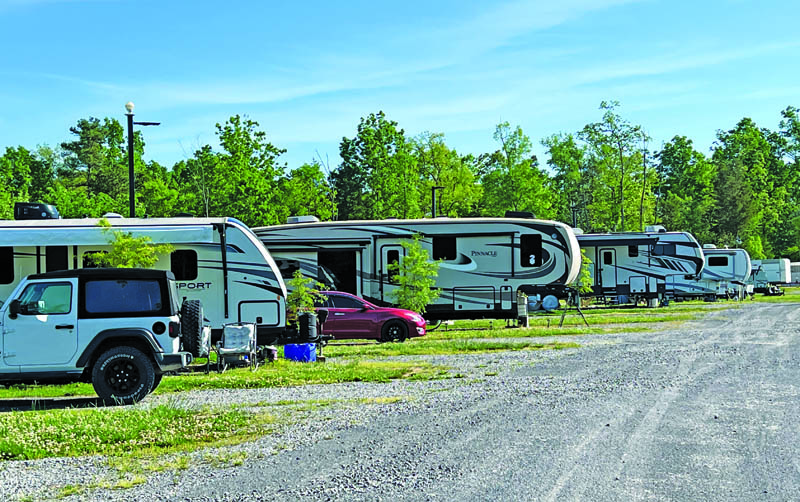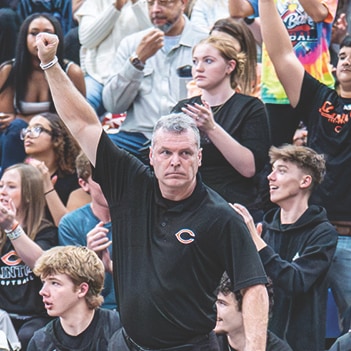Federal judge: ‘Vacate’ the RV park
Covenant Life Church has 30 days to close ‘Retreat’

Seven travel trailers remained on the site at the Covenant Life Church’s RV park on Friday (May 3), out of 16 available spaces. A federal judge has ordered the church to shut down the park and remove the occupants by May 31. (photo:G. Chambers Williams III )
That means that, pending a stay on appeal from the church if one is sought, the church must close the RV park, which it has recently begun referring to as a “retreat,” until or unless it can obtain a certificate of occupancy and a permit for use of city water on the site.
Here is the court’s exact language granting the city’s request to close the facility, which sits on church property along Andersonville Highway and Norris Freeway (U.S. 441) and has been in operation without having any permits to allow for it since sometime in 2019:
“Covenant Life is PERMANENTLY ENJOINED from the following conduct: (1) operating the Retreat without a certificate of occupancy; and (2) supplying water to the Retreat from the garden hose in circumvention of the now-lifted stop work order and without a plumbing permit.
“The terms of this injunction shall take effect 30 days from the entry of this Order (May 1).
“If Covenant Life fails to obtain a certificate of occupancy and fails to obtain the required permit for its use of the garden hose within 30 days from the entry of this Order, Covenant Life SHALL cease operation of the Retreat, and all guests SHALL vacate the premises.”
As the church’s own attorney, Daniel Sanders, has acknowledged in open court, Covenant Life built and opened its “Solid Rock RV Park” in 2019 as a commercial enterprise on restricted church property without first obtaining a city of Norris required change in zoning for the property, or getting the necessary city building permits.
Norris last October filed suit in the federal court against Covenant Life that sought to have the court force the shutdown of the RV park, which remains in operation – although now without a bathhouse or an approved fresh water source for its residents.
The church tore down the bathhouse last November after complaints from the city that it was built illegally.
Although the church now admits that the facility was initially built as a commercial enterprise called the “Solid Rock RV Park,” and had charged rent for campers using the park, it argued in documents filed in U.S. District Court that the park now operates solely as a “church ministry” called the “Solid Rock Retreat,” and accepts only “voluntary donations” from people living in recreational vehicles in the park, which has 16 pull-through RV sites initially provided with electric, sewer and water hookups.
As of Monday, there were still seven RV units parked on the site and hooked up to electric service provided by the church.
City officials have pointed out that the church’s own signs at the site – which have since been removed -- called it the “Solid Rock RV Park, and that until the city began to take action against the park, the church even had a website called www.thesolidrockrvpark.com.
That website, which the church has now shut down, advertised the site as a regular RV park and campground and allowed potential guests to reserve sites and pay up front for their use.
Furthermore, several long-time residents of the RV park – which has until recently remained full or close to it since it opened – reported to the city that they were charged $800 per month rent for a space to park their trailers or motorhomes, and that the church automatically collected the rent through monthly debits of their bank accounts.
The church also has insisted that it operates the “retreat” only as a Christian ministry, and that it’s just a “parking lot,” and was never intended to be an RV park, as such:
“ … (T)he Church provides overnight parking and accommodation to congregants, missionaries, and others in need as a form of Christian retreat and an exercise of deeply held religious belief,” the church’s attorney Daniel Sanders said in a letter to the city included in a court filing. “I am informed that no commercial transactions are involved.
“Rather, the Church accepts offerings essential for the maintenance of its facilities on a free-will basis.
“Individuals who utilize the overnight parking areas receive prayer and reading of Holy Scripture. They are expected to attend worship services, commune with Church leaders, and participate in other religious programs available on the Church property.
“Indeed, the Church offers certain religious programs tailored to the needs of those who use the overnight parking at times when regular congregants are not present at the Church. Missionaries utilize Church facilities to further their ministries and other charitable and religious purposes.”
The church also argued in its court filings that its use of the property for the overnight parking of RVs is allowed under city zoning laws because the area is simply a “parking lot,” not an RV park. But the U.S. District Court rejected that argument.
City officials contended that if it was only a parking lot, the church would not have needed to install water, sewer and electric hookups to each of the 16 spaces, nor would it have needed to build a bathhouse – which had a sign on it saying, “Solid Rock RV Park.”
Additionally, the church had applied to and received a permit from the Tennessee Department of Health last year to operate the RV park as an “organized camp,” the city’s filings noted.
The federal court also denied Covenant Life’s claim that it would suffer financial harm through a loss of “donations” if it is forced to shut down the RV park.
In its latest court filing, requesting the injunction and summary judgment, the city said:
“To the extent Covenant Life argues that it would suffer harm, it has only itself to blame.
“It declined at every stage to engage in the permitting and approval process that every citizen must follow.
“It should not be allowed to argue substantial harm, or argue that a significant bond should be required, where this action is the result of its own obstinance rather than any wrongful act on the part of the City.”
In its order last week, the court denied the church’s request that the city post a security bond that would cover the church’s expenses if the church should ultimately prevail in the case in U.S. District Court.
Norris City Council members authorized the countersuit and the move of the case to federal court from Anderson County Chancery Court after meeting with the city’s lawyers in a closed session Sept. 6.
This move came after the church filed its own lawsuit in Chancery Court in August, seeking to prevent the city from turning off water service to the church in response to Covenant Life’s action to provide Norris city water to the Solid Rock RV Park in violation of a June agreement with the city not to do so.
The church was running a simple garden hose to the RV park vehicles that was connected to a spigot on the side of the church building, after the church had agreed to cut off underground water service that it connected to the RV park without the city water department’s approval.
In its own lawsuit against the city, Covenant Life’s attorney argued that Norris was in violation of the 14th Amendment to the U.S. Constitution in threatening to cut off water to the church without first going through court to do so.
The 14th amendment says, “No state shall make or enforce any law which shall abridge the privileges or immunities of citizens of the United States; nor shall any state deprive any person of life, liberty, or property, without due process of law; nor deny to any person within its jurisdiction the equal protection of the laws.”
During the “emergency” hearing in Chancery Court on Aug. 18, Chancellor James W. Brooks Jr. found no grounds for a claim based on the 14th amendment, and declined to issue the restraining order sought by the church.
But city officials have said that by opening a claim under the U.S. Constitution, Covenant Life cleared the way for moving the case to the U.S. District Court. Knoxville.


